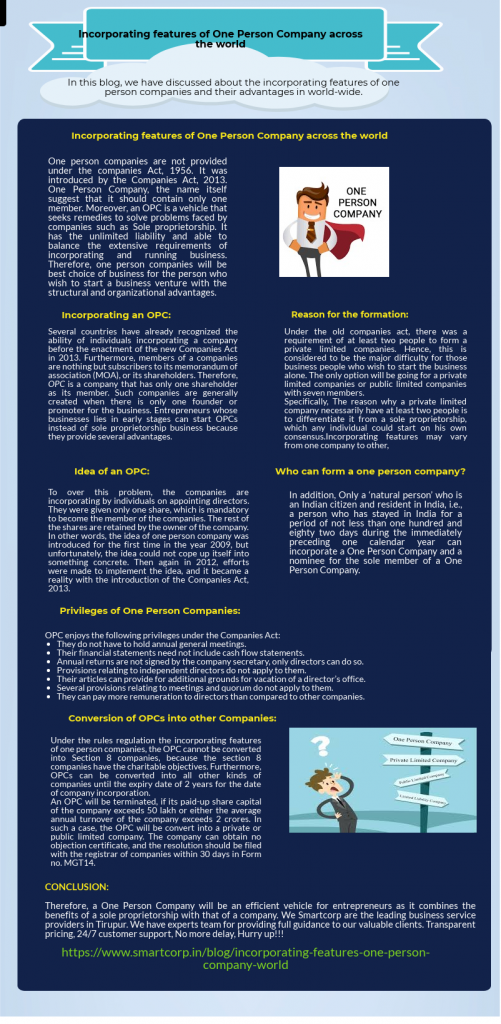
Incorporating features of One Person Company across the world
In this blog, we have discussed about the incorporating features of one person companies and their advantages in world-wide.One person companies are not provided under the companies Act, 1956. It was introduced by the Companies Act, 2013. One Person Company, the name itself suggest that it should contain only one member. Moreover, an OPC is a vehicle that seeks remedies to solve problems faced by companies such as Sole proprietorship. It has the unlimited liability and able to balance the extensive requirements of incorporating and running business. Therefore, one person companies will be best choice of business for the person who wish to start a business venture with the structural and organizational advantages.

Moreover, an one person company is a vehicle that seeks remedies to solve problems faced by companies such as Sole proprietorship. It has the unlimited liability and able to balance the extensive requirements of incorporating and running business. Therefore, one person companies will be best choice of business for the person who wish to start a business venture with the structural and organizational advantages.
Incorporating an OPC:
Several countries have already recognized the ability of individuals incorporating a company before the enactment of the new Companies Act in 2013. Furthermore, members of a companies are nothing but subscribers to its memorandum of association (MOA), or its shareholders. Therefore, OPC is a company that has only one shareholder as its member. Such companies are generally created when there is only one founder or promoter for the business. Entrepreneurs whose businesses lies in early stages can start OPCs instead of sole proprietorship business because they provide several advantages.
Incorporating History of OPC:
The concept of one person company was first recommended by the experts committee of Dr. JJ Irani in 2005. Chiefly, the committee decided to classify the companies based on size, members and the control. In reference to the OPC, it is said that “it is the time that entrepreneurial capabilities of the people are given an outlet for the participation in the economical activates”.

Moreover, it is also recommended that a simpler rule through exemptions be made applicable to OPCs in order that an entrepreneur is not required to expend excessive time and resources on procedure that could otherwise be applied to its business activities.
Consequently, major counterparts of Indian OPCs are found in Europe, United States and Australia have resulted in strengthening the economies of the countries. Similarly, OPC will give businessmen all the benefits that a private business will give. OPCs provides the opportunity to people to take advantage of the unique characteristics of a company while remaining independent.
Reason for the formation:
Under the old companies act, there was a requirement of at least two people to form a private limited companies. Hence, this is considered to be the major difficulty for those business people who wish to start the business alone. The only option will be going for a private limited companies or public limited companies with seven members.
Specifically, The reason why a private limited company necessarily have at least two people is to differentiate it from a sole proprietorship, which any individual could start on his own consensus.Incorporating features may vary from one company to other,
Idea of an OPC:
To over this problem, the companies are incorporating by individuals on appointing directors. They were given only one share, which is mandatory to become the member of the companies. The rest of the shares are retained by the owner of the company. In other words, the idea of one person company was introduced for the first time in the year 2009, but unfortunately, the idea could not cope up itself into something concrete. Then again in 2012, efforts were made to implement the idea, and it became a reality with the introduction of the Companies Act, 2013.
Features of a One Person Company

Some of the general features of a one-person company:
Private company:
Section 3(1)(c) of the Companies Act says that a single person can form a company for any lawful purpose. It further describes OPCs as private companies.
Single member:
Moreover, One person companies should have only one member or shareholder, unlike other private companies.
Nominee:
A unique feature of OPCs that separates it from other kinds of companies is that the sole member of the company has to mention a nominee while registering the company.
No perpetual succession:
Since there is only one member in an OPC, his death will result in the nominee choosing or rejecting to become its sole member. This does not happen in other companies as they follow the concept of perpetual succession.
Minimum one director:
In essence, OPCs need to have minimum one person (the member) as director. They can have a maximum of 15 directors.
No minimum paid-up share capital:
Companies Act, 2013 has not prescribed any amount as minimum paid-up capital for OPCs.
Special privileges:
OPCs enjoys privileges and exemptions under the Companies Act compared to other companies.
Who can form a one person company?
In addition, Only a ‘natural person’ who is an Indian citizen and resident in India, i.e., a person who has stayed in India for a period of not less than one hundred and eighty two days during the immediately preceding one calendar year can incorporate a One Person Company and a nominee for the sole member of a One Person Company.
AS PER ONE PERSON COMPANY (RULE 3 OF COMPANIES (INCORPORATION) RULES, 2014)
- A person cannot incorporate more than one OPC or be the nominee of more than One Person Company
- A minor shall not become member or nominee of the One Person Company or can hold share with beneficial interest.
- Therefore, Company cannot be incorporated or converted into a company under section 8 of the Act.
- Consequently, Company cannot carry out Non-Banking Financial Investment activities including investment in securities of anybody corporate.
- No such company can convert voluntarily into any kind of company unless two years have expired from the date of incorporation of One Person Company, except when threshold limit (paid up share capital) is increased beyond fifty lakh rupees or its average annual turnover during the relevant period exceeds two crore rupees.
Privileges of One Person Companies:

OPC enjoys the following privileges under the Companies Act:
- They do not have to hold annual general meetings.
- Their financial statements need not include cash flow statements.
- Annual returns are not signed by the company secretary, only directors can do so.
- Provisions relating to independent directors do not apply to them.
- Their articles can provide for additional grounds for vacation of a director’s office.
- Several provisions relating to meetings and quorum do not apply to them.
- They can pay more remuneration to directors than compared to other companies.
Membership in One Person Companies:
Only natural persons who are Indian citizens and residents are eligible to incorporating a one person company in India. The same condition applies to nominees of OPCs. Further, such a natural person cannot be a member or nominee of more than one OPC at any point of time.
Chiefly, it is important to note that only natural persons can become members of OPCs. This does not happen in the case of companies wherein companies themselves can own shares and be members. Further, the law prohibits minors from being members or nominees of OPCs.
Conversion of OPCs into other Companies:

Under the rules regulation the incorporating features of one person companies, the OPC cannot be converted into Section 8 companies, because the section 8 companies have the charitable objectives. Furthermore, OPCs can be converted into all other kinds of companies until the expiry date of 2 years for the date of company incorporation.
An OPC will be terminated, if its paid-up share capital of the company exceeds 50 lakh or either the average annual turnover of the company exceeds 2 crores. In such a case, the OPC will be convert into a private or public limited company. The company can obtain no objection certificate, and the resolution should be filed with the registrar of companies within 30 days in Form no. MGT14.
One Person Company as a Global Perspective:
Although OPC is a recent concept in India, it has been widespread in the United Kingdom for many years by Lord Herschel in the renowned case of Saloman v. Saloman & Co. Ltd where he acknowledged the idea of a one-person company as lawful. Further, under Section 7 of the UK Companies Act, 2006, a one-person public and a private company can be formed by complying with the registration and Memorandum of Association requirements, as laid down in the UK Act.
Similarly, in the United States, almost all states issues license for single member limited liability companies with different state-specific laws. Amongst Asian countries, Pakistan, Singapore and China adopted OPC in their legal systems in 2003, 2004 and 2005 respectively.
Conclusion:
Therefore, a One Person Company will be an efficient vehicle for entrepreneurs as it combines the benefits of a sole proprietorship with that of a company. We Smartcorp are the leading business service providers in Tirupur. We have experts team for providing full guidance to our valuable clients. Transparent pricing, 24/7 customer support, No more delay, Hurry up!!!

